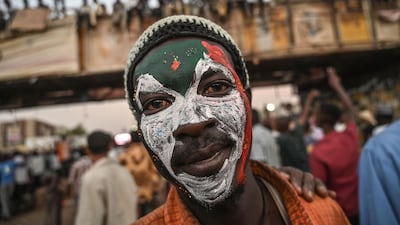One of the world’s longest-serving rulers, Omar Al Bashir of Sudan, has been forced out by protests after almost 30 years. But was Mr Al Bashir’s fate sealed eight years ago, when South Sudan became independent, or five years ago, when oil prices fell?
Protests over a rise in bread prices started in rural areas in December. They spread across the country, quietened down, then revived, perhaps encouraged by the enforced resignation of President Bouteflika in Algeria. On April 11, the army forced Mr Al Bashir out.
Defence minister Awad Ibn Auf, a Bashir ally facing war crimes allegations, took over for a “transitional period”, but was promptly replaced by general Abdel Fattah Al Burhan. The protestors continue to demand a civilian government.
Oil exploration took a long time to get going in Sudan, Africa’s largest country before its break-up. Chevron of the US did the initial work in the late 1970s, but civil war against southern rebels broke out in 1983 when then-president Gaafar Numeiri imposed Islamist policies. Numeiri was overthrown by popular protests in 1985, Mr Al Bashir seized power in 1989, but war continued, both in the south and in the western Darfur region.
Oil production began in 1992, most of it in what is now South Sudan, but with the benefits flowing to Khartoum. In 2011, South Sudan finally became independent, but the divorce settlement had two crucial flaws in its handling of oil. And as petroleum was fated to remain the foundation of the economy in both Sudans, at least initially, this doomed them to disaster.
First, the status of the oil-rich district of Abyei was left for future agreement, which instead erupted into cross-border fighting. And second, the deal on dividing oil revenues was unworkable.
South Sudan emerged with about three-quarters of the former state’s oil production, but its only pipeline export route runs through the north to Port Sudan on the Red Sea. Its relatively limited reserves, insecurity and the difficulties of negotiating with other countries have prevented plans for an alternative route through Uganda and Kenya or Tanzania or even Ethiopia to Djibouti from advancing.
Juba offered to pay Khartoum $1 per barrel transported through the line, but instead was faced with a demand for $36 per barrel. With 2011 prices around $100 per barrel, Sudan would have reaped more in total oil revenues than South Sudan. South Sudan did not pay, Sudan shut down the pipeline, and the new state was plunged within two years into economic crisis and civil war.

After 400,000 deaths, a unity deal between the two South Sudanese factions is due to come into effect in May. Output of 359,000 barrels per day in the last year before independence dwindled almost to nothing in 2012. It has recovered since to about 145,000 bpd, but the transit fees Khartoum receives were cut in 2016 to reflect lower world oil prices. Juba’s oil minister hopes, rather optimistically, to raise output to 350,000 bpd by the middle of next year.
Meanwhile, Sudan’s own production of about 85,000 bpd has increased somewhat with the development of new fields, but not enough to cover the deficit, worsened by the fall in prices since 2014. Even after the separation of the south, an over-sized security sector, eating up half of the government budget, has continued to wage war in Darfur and the southern region of Kordofan.
Khartoum printed money to pay its bills, and tried to cut fuel and food subsidies, sparking the current round of protests. Land sales to foreign companies for agriculture triggered further discontent. Sanctions imposed by the US over the atrocities in Darfur were largely removed in 2017, but their chilling effect has remained, with most western banks unwilling to deal with the country. Inflation this year is forecast by the IMF at almost 50 per cent, with GDP falling 2.3 per cent and the currency losing nine-tenths of its value.
The new government will face a difficult economic task. Reducing food and fuel subsidies is essential to tackle the deficit and shore up the currency, but it will cause further anger amongst both the rural populace and the urban middle class. Targeting subsidies is vital but a tricky administrative task. Negotiating peace in the peripheral areas would allow reducing the size of the security forces, essential to slash the bloated budget, but that would risk a further military coup.
To shore up oil revenues, the previous government planned in November to offer 30 to 35 new blocks for exploration. It would take years for these to come into production. In the interim, keeping South Sudan’s fragile peace deal alive is key – though the president in Juba, Salva Kiir, snarkily offered to mediate Khartoum’s political transition.
Sudan underwent forced economic diversification after the national break-up. Gold has become the country’s leading export, ahead of oil. Ethiopia’s Grand Renaissance Dam on the Blue Nile worries Egypt, but when completed in 2022, it will allow a major expansion of irrigation in Sudan. The country has some of the world’s best solar power conditions.
A genuinely popular government with international support could rejoin the community of nations and build on these advantages. But the temptations of oil money are slippery. The new leadership in Khartoum will have a chance to learn from history, or to repeat it.
Robin M. Mills is CEO of Qamar Energy, and author of The Myth of the Oil Crisis


